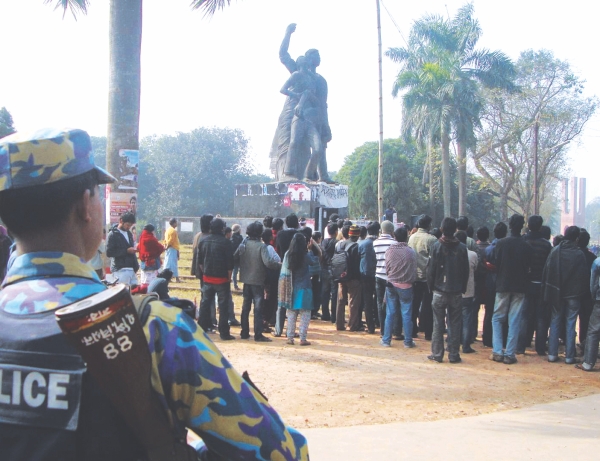| Home - Back Issues - The Team - Contact Us |
 |
| Volume 11 |Issue 22| June 01, 2012 | |
|
|
Letters The Ethical Businessman It is matter of great achievement and pride that one of the leading businessmen of our country has been awarded the “Oslo Business for Peace Award” for contributing to society through business. The present business environment has become highly competitive and rigid. Success in today's day and age is usually considered an outcome of unethical business practices. For the most part, business organisations ignore the impact of their actions on society. However, the award given to Mr Latifur Rahman shows us that even today, in the midst of cut-throat competition and a general absence of ethics, businesses can be run profitably and morally. The societal marketing concept states that a business must operate its functions keeping three factors in mind – profit, customer's needs and, of course, the society. Unless and until a company is fully guided by this principle, it will not be able to add value to society and to itself in the long run. Hats off to Latifur Rahman! Khondoker Rezwan Tanvir **** I thank the writer for his timely feature – 'Doing Business Ethically'. It introduced readers to 'Latifur Rahman, a business man respected both at home and abroad. The story of Rahman's life is really inspiring. By winning the Oslo Business for Peace Award, he has taken the country's name to great heights. Currently, majority of the businessmen, in the country, aim to maximise their profits, at the cost of people's woes. Despite the wide-scale corruption, Latifur Rahman has shown us that 'ethical business' isn't just an oxymoron. We need more people like Rahman who can contribute positively and help develop the country. The government should support such honest businessmen and help them. Apart from that, it also needs to take steps against corrupt businessmen. I thank Latifur Rahman for his contribution and I hope that many more businessmen follow his path. Md Azam Khan
The Politics of Education The special feature titled 'The Coaching Business' published on 25 May, 2012, represents the horrible politics of urban-education. Teachers, students and parents, are responsible for the current scenario. The students are reluctant to study in classrooms and prefer to go for extra classes. The parents are so competitive that they want their children to get the highest grade in the exam through any means possible. If we compare urban education with rural education, we will see that the latter category obtains remarkable marks without any private coaching. They don't have enough money and in spite of all the difficulties they are doing well. The students need to be cautious so that their teachers don't exploit them. Parents too, have to take a stance against the coaching centres. The government and other concerned officials should review the related facilities of teachers based on the present socio-economic status. Md Nasir Uddin Ensure minimum wage of tea workers It is surprising to know that the average wage of a worker of the tea industry in Bangladesh is Tk 45 per day. How is it possible for the tea garden owners to pay such an atrociously low wage to their workers in a democratic country? On the other hand, how can the government just turn a blind eye towards such inhumane treatment of workers all these years? In Bangladesh, a day labourer gets Tk 200 to Tk 400 in the agriculture sector along with one meal for a day's work. The wage varies from season to season. But no one can imagine employing them for less than Tk 200 a day. The tea companies have been making millions every year, while depriving their workers of a reasonable minimum wage. Most of our industrialists are not ready to recognise the contributions of the labourers and continue to exploit them. I urge the government to fix a minimum wage for workers who work in tea gardens in Bangladesh and protect the basic interest of its citizens. Mohammad Ashraf Hossain VC-ious matters in Universities The May 18, 2012 issue of the Star focused on a very important matter which many people are not aware of but it is important for the future of our country. The four largest universities of our country are running by unfair means or foul. The universities are autonomous institutions and they should be run in a democratic way. So, they should not be run by unelected VCs. Regular senate session, selection of panel for VC and appointment by the president; everything should be maintained by the regular process stipulated in The University Act 1973. The elected VCs may not bring overnight change to the universities but democratic election is a good example that the students will learn to follow. The recent incidents at Jahangirnagar University have, to some extent, brought the attention of our civil society and the government to the irregularities of the universities. Every political party may have their student wing in every university and this is right. But governments should not appoint unelected VCs for their party's interest. On the other hand, students should learn how to question power and illegal authority, instead of compromising with power. Only then we will be able to lead the country to betterment. Indrajit Kumar Das
Copyright (R) thedailystar.net 2012 |
